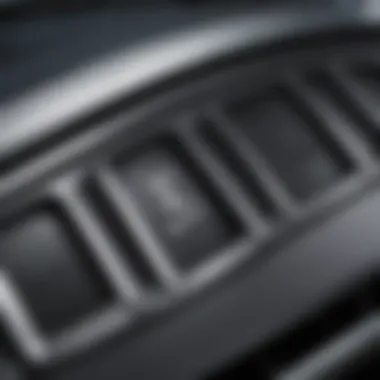Essential Techniques for VIN Number Lookup


Intro
Understanding a vehicle's history is like peeling back the layers of an onion; it reveals insights that are crucial for both buyers and enthusiasts alike. Central to this quest for knowledge is the Vehicle Identification Number, or VIN. This distinctive 17-character code serves as a fingerprint for your car, motorcycle, or truck. Knowing how to look it up and decode it can be the difference between purchasing a gem or a lemon.
In this guide, we’ll embark on a journey to unlock the myriad ways in which you can effectively look up a VIN. Our discussion will encompass not just the significance of the VIN, but also the tools and techniques necessary for verifying a vehicle’s history. Whether you’re a seasoned automotive aficionado or a first-time buyer, this resource will empower you with the insight and knowledge you need to confidently navigate the world of vehicle identification.
Performance and Specifications
Looking at a vehicle's performance and specifications is often a priority when researching a potential purchase. The VIN plays a key role here, as it provides crucial information about the vehicle's engine, specifications, and even its fuel efficiency.
Engine Specifications
The engine is the heart of any automobile, and its characteristics can often be determined by the VIN. When you decode a VIN, specific segments reveal details about the engine type, size, and even the output.
Fuel Efficiency
With rising fuel prices, fuel efficiency is a significant concern for many buyers. The VIN can lead you to information regarding the Environmental Protection Agency (EPA) ratings for a particular vehicle. By researching the VIN, you can ascertain whether the vehicle meets your expectations for gas mileage or if it’s likely to be a thirsty beast on the road.
Cost of Ownership
Purchasing a vehicle is just the tip of the iceberg; understanding the cost of ownership is essential. The VIN assists not only in determining the initial purchase price but also in evaluating maintenance costs over time.
Initial Purchase Price
Using the VIN, prospective buyers can access databases that provide historical sale prices for specific makes and models. This makes it easier to identify if a car is priced fairly. This vital piece of information can help you negotiate a better deal during the buying process.
Maintenance Costs
It’s not just about how much you pay initially but also about how much you'll spend down the road. The VIN can guide you to vehicle history reports that may outline any past incidents. Knowing whether a car has been in a major accident can help inform your decision and provide insights into future maintenance challenges.
Information derived from a VIN can prevent costly mistakes. Always ensure to verify any crucial details before making a purchase.
Prolusion to VIN Numbers
The world of vehicles is vast and complex, but there’s one component that acts as a steadfast identifier: the Vehicle Identification Number, or VIN for short. Understanding VINs is crucial for both prospective buyers and automotive aficionados alike. This guide will draw back the curtain on what a VIN actually is and why it holds immense significance in confirming a vehicle's identity and history.
Definition of VIN
A VIN is a unique 17-character string assigned to each vehicle by its manufacturer. Think of it as a vehicle's fingerprint. Every character in a VIN serves a purpose, containing vital information about the vehicle's manufacturer, model, year of production, and more. For example, the first three characters make up the World Manufacturer Identifier, which tells you precisely who made the vehicle. The next set of characters includes descriptors related to the vehicle's body type and engine type. Finally, the last characters provide specific details tied to the vehicle's unique serial number. This string of alphanumeric characters is far more than a mere identifier; it’s a window into the vehicle's soul.
Importance of VIN for Vehicle Identification
The importance of the VIN can’t be overstated. It acts as a unique key to unlock a treasure trove of information about any vehicle, including its history and specifications. Here are a few key reasons why understanding VINs is essential:
- Authentication: Confirming that a vehicle is what it claims to be is essential. The VIN clarifies if the vehicle in question matches the paper trail—like registration or insurance documents.
- Avoiding Fraud: Scams abound in the automotive world. A counterfeit VIN could mislead a buyer. Knowing how to look up and decode a VIN can help avoid costly mistakes.
- Tracking Recalls: Manufacturers sometimes issue recalls for specific models. A VIN allows you to check if a vehicle has been subject to any recalls, helping you avoid unsafe vehicles.
- Checking History: Want to know if the car had prior accidents or damages? A VIN lookup can provide a history report that reveals critical data about the vehicle's past.
In a nutshell, grasping the significance of the VIN is the first step in savvy vehicle ownership or purchasing. Knowing how to locate and interpret this critical number can save time, money, and hassle for both current and future vehicle owners.
"A VIN is not just a number; it’s a detailed record of a vehicle's life story, from its birth to its present state."
Given the sheer volume of information encapsulated within a VIN, this guide seeks to equip you with the knowledge necessary to understand how to leverage this powerful tool in your automotive journey.
Physical Location of the VIN
Understanding where to physically locate the Vehicle Identification Number (VIN) on a car not only eases the process of identifying a vehicle but also serves multiple purposes related to safety and legality. The VIN acts as the vehicle's fingerprint, unique to every automobile, which makes finding it crucial when purchasing a used vehicle, verifying ownership, or for insurance and registration purposes. Knowing the common spots where the VIN is stamped can save you a lot of hassle down the road, ensuring that you're dealing with a legitimate vehicle and not a stolen one or one with misleading history.
Common Locations to Find the VIN
Dashboard
The dashboard is often the most straightforward spot to find the VIN, usually located at the lower left corner of the windshield. This visibility is a key aspect since it allows law enforcement and inspectors to quickly verify the vehicle's identity from outside the car. The significant characteristic of the dashboard is that it is easy to see from the outside, making it a popular choice for theft prevention and identification.


One unique feature of the dashboard location is that it offers a quick glimpse for potential buyers, but there's a caveat; if the windshield is replaced, the VIN sticker can be lost or altered. This is why it is essential to corroborate the VIN from multiple locations before making a purchase decision.
Driver's Side Door
Another prominent spot for the VIN is on the driver's side door, or more specifically, the door jamb. This location is typically marked with a sticker that displays not only the VIN but also various specifications regarding the vehicle, such as tire pressure and manufacturing details. The advantage of this position is that it provides an immediate reference upon opening the driver's door.
However, one must keep in mind that if the door has been replaced, the sticker could potentially be missing. This could lead to confusion when verifying the identity of the vehicle, making it critical to double-check against other locations.
Under the Hood
Looking under the hood can also unveil the VIN, usually found on the front of the engine block or in a stamped location on the firewall. This spot serves as a robust verification point since it’s less likely to be tampered with compared to the more visible locations.
A notable aspect of the under-the-hood location is that it often indicates the original manufacturing of the engine. If you find a VIN there, it serves as an assurance of authenticity; however, accessing this area might require a bit more effort, especially if you're not mechanically inclined.
On the Engine Block
The engine block itself may also house another rendition of the VIN. Locating it here is significant because, in some cases, the engine might have been replaced, and this can lead to discrepancies between what’s on the paperwork and what’s actually in the vehicle.
This particular location is favored for providing robustness against alterations, as it’s integral to the vehicle itself. However, since it requires a closer inspection, it may not be the first choice for many buyers. The real disadvantage would be the added time and effort required to check this area, potentially resulting in missed information unless the buyer is thorough.
What to Do If the VIN is Missing or Damaged
If you ever find yourself in the predicament of having a missing or damaged VIN, the first step is to gather additional information from other places on the vehicle, such as the title or registration documents.
If all else fails, contacting the manufacturer or a local dealership could provide guidance. Remember, a vehicle without a VIN or with a VIN that is questionable can lead to significant legal troubles, so addressing this situation promptly is essential.
Decoding the VIN
Understanding how to decode the VIN is key, not just for enthusiasts, but also for anyone in the market for a vehicle, be it for personal use or investment. A VIN doesn't merely serve as a series of characters etched into the frame—it's a trove of vital information. Successfully deciphering it enables you to uncover a vehicle's history, spot potential pitfalls before finalizing a purchase, and make potentially better-informed decisions. It's akin to reading the resume of a car—each section tells a story, and every character has its significance.
Structure of the VIN
The Vehicle Identification Number is structured in a way that each segment holds specific meanings. This structured format reflects a standardized approach, allowing anyone to break it down into understandable parts. Below are the key components:
World Manufacturer Identifier
The World Manufacturer Identifier (WMI) consists of the first three characters of the VIN. This section is crucial, as it pinpoints who made the vehicle. For example, if a vehicle starts with '1HG', you know it's a Honda from the United States. This unique aspect aids buyers and sellers alike in authenticating the manufacturer's claims.
One key characteristic of the WMI is its ability to identify not only the manufacturer but also the geographical location of production. If you’re venturing into the international market, knowing the WMI can save you from making an ill-advised purchase. However, while the WMI provides critical information about the maker, it doesn't divulge anything about the specifics of the car itself—it's one leg of the analysis.
Vehicle Descriptor Section
Next up is the Vehicle Descriptor Section (VDS), which follows the WMI. This part encompasses characters four through nine of the VIN and gives detailed information about the model, body style, engine type, and sometimes the transmission. Let's say the VDS reveals a code that indicates it’s a sport model—this section serves to hone in on what exactly you're dealing with.
The VDS is a beneficial section since it allows prospective buyers to validate the seller's claims about the vehicle’s specifications. However, one should be cautious, as some variations or discrepancies may appear due to modifications or regional differences—always cross-reference these details.
Vehicle Identifier Section
Last but far from least, the Vehicle Identifier Section (VIS) rounds out the VIN. This segment comprises characters ten through seventeen and is where you will find unique identifiers for the specific car, such as the production year, assembly plant, and the serial number. Importantly, the VIS plays a significant role in determining the vehicle's specific history, like whether it has been involved in major accidents.
The strength of the VIS lies in its uniqueness—no two vehicles will have the same VIS, providing a layer of security and legitimacy to the identification process. That said, if one were to misinterpret any number here, it could lead to errors when recanting the vehicle's background or registration. Always double-check to ensure complete accuracy at this level.
How to Interpret Each Section
Once you're familiar with the segments of the VIN, interpreting each part becomes a systematic process. It’s akin to piecing together a puzzle. You start with the WMI to identify the manufacturer, then move on to the VDS for specifications, and finally the VIS for unique traits. By taking this structured approach, you're more likely to gather a comprehensive understanding of the vehicle and make astute choices when considering a purchase. This clarity can save you plenty of headaches and unforeseen costs in the future.
Online Resources for VIN Lookup
When it comes to checking the history and details of a vehicle, online resources have revolutionized the way we access information. The significance of utilizing online resources for VIN lookup cannot be overstated. Whether you're a car buyer, seller, or an enthusiast, having access to accurate, readily available information empowers you to make informed decisions about a vehicle. These digital platforms grant an unprecedented look into a vehicle's past, helping to illuminate details like previous ownership, accident history, and confirmed specifications.
Government Websites


National Highway Traffic Safety Administration
The National Highway Traffic Safety Administration (NHTSA) serves as a crucial resource in the realm of VIN lookup. This government agency not only regulates vehicle safety but also maintains a comprehensive database of VIN information. One of the standout characteristics of the NHTSA is its user-friendly VIN lookup tool, which allows users to quickly access basic vehicle information just by entering the VIN.
A notable advantage of using the NHTSA's site is that it provides essential details such as recalls, manufacturer information, and safety ratings—all valuable for prospective buyers or current owners wanting to ensure their vehicle is safe and compliant. However, while the NHTSA offers a reliable source, it may lack a detailed account of a vehicle's history beyond safety features, which can be limiting for those seeking in-depth insights.
State Websites
State DMV websites also play a significant role in VIN lookup. Each state's Department of Motor Vehicles offers access to information related to vehicle registrations, ownership histories, and in some cases, accidents recorded against the VIN. The key characteristic of these sites is their localized data—meaning you can find very specific information pertinent to the vehicle in question.
This localized focus makes state DMV sites an excellent choice for those looking for accurate ownership information and any liens against the vehicle. A unique advantage of these resources is the potential for direct contact with local vehicle registration representatives. The downside, however, is that not all states provide the same level of detail online, which can leave users wanting for additional data.
Third-Party VIN Lookup Services
Carfax
Carfax is perhaps one of the most well-recognized names when it comes to vehicle history reports. This service provides comprehensive reports based on the VIN, detailing everything from previous accidents to service history. The key selling point of Carfax is its extensive database, which incorporates information from numerous sources, making its reports fairly thorough.
One unique feature of Carfax is its user-friendly interface, which allows quick access to reports with minimal hassle. However, this convenience does come with a price; obtaining a complete vehicle history report usually requires a fee, which some users may find off-putting. Still, for those serious about ensuring a vehicle's authenticity, the investment can be worthwhile.
AutoCheck
Another player in the VIN lookup arena is AutoCheck, known for its emphasis on auction data and comprehensive vehicle history. AutoCheck offers users the chance to see not only a vehicle’s past accidents but also its performance at auctions, which can provide insights into its resale potential. Its distinct characteristic is the AutoCheck Score, a simple numerical score that evaluates a vehicle's history against similar vehicles.
This feature simplifies the process of understanding a vehicle's condition. Nonetheless, like Carfax, it typically requires a payment to gain access to detailed reports. It can be advantageous for sellers looking to gauge a vehicle's potential market value as well.
VinAudit
VinAudit presents another alternative for those looking into a vehicle's VIN. This service highlights affordability as one of its primary advantages, often costing significantly less than other similar services. VinAudit still provides reports covering essential information, such as title records and other ownership details.
A unique aspect of VinAudit is the option for users to gain access to multiple reports at a lower overall cost—a potential upside for dealerships or individual sellers who need to check several vehicles. However, it might not be as comprehensive as Carfax or AutoCheck, especially regarding accidents and detailed service history, which should be taken into account when deciding on which service to use.
In short, the online landscape for VIN lookup is diverse, with various resources available to cater to different needs. A careful consideration of each option, from government sites to third-party services, allows users to make the most informed decisions regarding vehicle identification and history.
Offline Resources for VIN Lookup
When it comes to tracking down a Vehicle Identification Number (VIN), many folks often turn to the internet first. But sometimes, traditional means can yield just as important insights, if not more. Offline resources offer unique benefits and considerations that should not be overlooked. Whether it’s a personal connection or simply the lack of a stable internet connection, the following methods present useful avenues for obtaining or verifying the VIN.
Contacting Manufacturers
Tapping into the manufacturer for VIN information can be a hidden gem for car owners and buyers alike. Many manufacturers maintain detailed records of their vehicles, sometimes spanning decades. If you find yourself puzzled about the VIN or if it seems to be missing, picking up the phone to call the manufacturer could bridge the gap.
- Details to Provide: Be ready with as much information as you can muster. This usually includes the model, year, and any other detail on the vehicle. The more info you provide, the easier it will be for them to help you.
- Considerations: Some manufacturers may require proof of ownership before divulging any sensitive information. Have your paperwork handy, as that could expedite the process.
Connecting directly with a manufacturer not only clears up VIN-related questions, but it can also cue you into any recalls, warranties, or service bulletins associated with that specific vehicle—insights you might miss online.
Visiting Local Dealerships
Local dealerships aren't just for car buying; they are also valuable resources for VIN lookup. Dealers, especially those associated with the brand of the vehicle you own, often have access to internal systems that DIYers don’t.
- What They Can Offer: From vehicle history reports that explain previous ownerships and repair issues to access to the manufacturer's database, dealerships are well-equipped to assist.
- Build Relationships: Establishing rapport with dealership staff can be beneficial. They can keep an eye out for updates or needs you might have in the future.
However, be prepared for the possibility that some dealerships might charge for their services, so that’s something to keep in mind before making the trek.
Using Local Government Resources
Local government resources can be an invaluable backup when you’re trying to uncover your vehicle's VIN.
- DMV's Role: The Department of Motor Vehicles is often the first stop, as they maintain records of vehicle registrations. If you've lost your VIN or can't locate it, the DMV may be able to help you retrieve it based on other identifying details.
- Police Assistance: In case of suspected tampering, local law enforcement can provide insights as well. They can help verify your VIN against their records, ensuring that everything checks out—quite essential for potential buyers.
Visiting a local DMV office or approaching police authorities may consume some time, and you’ll likely need to fill out some forms. However, the peace of mind that comes from verifying a vehicle’s history in person is often worth it.


Thus, employing these offline avenues can enhance your understanding of a VIN and provide layers of verification that internet searches simply can't replicate. These methods can truly empower potential buyers and existing owners to feel secure about their vehicle’s identity and history.
Interpreting VIN Lookup Results
When navigating the labyrinth of vehicle identification, understanding the results of a VIN lookup is paramount. A VIN offers insights not just into the make and model of the vehicle, but also its entire history. For individuals looking to purchase a car or simply wishing to know more about their current vehicle, the implications of interpreting these lookup results are immense. Not grasping this information could mean buying a lemon or overlooking crucial red flags that may affect a vehicle’s performance. Therefore, comprehending the data contained within a VIN lookup isn’t just beneficial; it’s essential for informed decision-making.
Understanding Vehicle History Reports
A vehicle history report (VHR) is a goldmine of information often derived from the VIN. It amalgamates data from multiple sources, shedding light on aspects like title status, previous accidents, service records, and much more. When you're peering at these reports, two things stand out most: clarity and detail.
- Title History: One of the first things to check is if the title has been branded, indicating prior accidents, salvage, or even theft. If a title is marked as ‘salvage,’ for instance, this tells you the vehicle suffered significant damage before being repaired.
- Accident History: Knowing whether a vehicle has been in a collision provides insight into future performance. A car that has sustained major collision damage might harbor issues that aren’t easily visible. For instance, frame damage can affect alignment for years.
- Service Records: These details illustrate whether the vehicle has been regularly serviced or neglected. Looking for consistent oil changes or tire rotations often hints at a well-maintained car. Mismatched records might raise questions regarding the vehicle's reliability.
In summary, a vehicle history report, when interpreted correctly, can either bolster or severely undermine the decision to purchase a vehicle. If you’ve got your eye on a used car, spending a few bucks on a detailed report could save you a fortune later.
Identifying Major Issues
Now that you’ve got a VHR in hand, the next step is dissecting that information to pinpoint major issues that may not be evident at first glance. Here’s what to focus on:
- Odometer Readings: Pay attention to the odometer reading in relation to its reported history. Discrepancies could indicate potential odometer fraud—yes, it's more common than one might think.
- Recalls: Check for recalls associated with the vehicle. Many cars have parts that might be dangerous if left unaddressed. For instance, vehicles with unfixed airbag recalls pose a significant risk during accidents.
- Flood Damage: Categories like ‘flood damaged’ produce a stark warning. Flood-damaged vehicles can harbor significant electrical issues down the line, which are notoriously expensive to fix.
Remember, while VIN lookup can provide a treasure trove of information, it’s all about how you sift through it. Verifying details, identifying discrepancies, and understanding their implications could mean the difference between a wise investment and a costly regret. As the saying goes, "An ounce of prevention is worth a pound of cure"—and in the automotive world, this rings especially true.
"Knowing vehicle history is easier with the right information. Take the time to read every detail, and don’t hesitate to ask questions."
In the end, mastering the art of interpreting VIN lookup results not only empowers you as a consumer but also gives you peace of mind as you drive away in your chosen vehicle.
Common Mistakes in VIN Lookup
When trying to look up a Vehicle Identification Number, it’s easy to stumble over a few common mistakes. Understanding these pitfalls is invaluable, especially for those new to the process or those who might not rely on VIN lookups regularly. Avoiding these errors can greatly enhance the accuracy of your findings and ensure you don’t miss critical details about a vehicle’s history and value.
Inputting Errors
One of the most frequent missteps people make while conducting a VIN lookup is inputting the VIN incorrectly. A VIN consists of 17 characters that combine both numbers and letters, making it easy to mix things up. Here are some specific points to consider in this regard:
- O versus 0, I versus 1: Confusion between similar characters is a common issue. For instance, a zero can easily be mistaken for the letter "O," and the letter "I" can look like the number "1." Double-check the VIN to make sure that you're entering the correct characters.
- Transposition: Sometimes, it’s a matter of transposing two digits by accident. Inputs might occur like 1G1ZT62889F123456 becoming 1G1ZT62889F132456, which can lead you to a wrong report altogether. A second glance can save you from this trap.
- Skipping Characters: It can also happen that one might accidentally skip a letter or number while typing. This might occur especially if you're dealing with a long string of characters. You might be in a hurry or distracted, and the result could be a complete misrepresentation in the lookup results.
When doing the lookup, consider cross-referencing the paperwork you have against the VIN entry. This can help cement accuracy in the process. The time spent carefully entering that number can save you from headaches down the line.
Misinterpreting Decoded Information
Beyond input errors, another significant area of mistake lies in misinterpreting decoded information. Once you've successfully entered the correct VIN and obtained results, comprehending what those results mean can be quite tricky. Here are a few common pitfalls:
- Assuming All Reports are the Same: Vehicle history reports can vary widely in detail and accuracy. Some services might not provide complete information, while others could show inconsistent results for the same VIN. If one service shows no prior accidents, don’t take it at face value—verify through multiple resources.
- Overlooking Specifics: When reviewing the decoded information, it’s easy to focus on major details like accident history and overlook smaller yet important aspects—like service history, title anomalies, or past ownership changes. Each detail can provide significant insights into the vehicle’s real value and reliability.
- Ignoring Regional Variances: Vehicle identification can sometimes hinge on localized laws or variations, particularly when it comes to custom modifications or salvaged titles. Be aware of differences that might apply to your specific state or region; what may be perceived as a non-issue elsewhere might be a red flag in your locality.
Understanding these nuances is essential for getting the full picture of a vehicle’s history. It’s not just about identifying the make and model; it’s about grasping every story the car has been through and what it could mean for its future.
By being aware of these common mistakes and taking the necessary steps to avoid them, you can greatly improve the efficacy of your VIN lookup and make more informed automotive decisions.
Benefits of Conducting a VIN Lookup
When it comes to owning or purchasing a vehicle, understanding its history and specifications is essential. The Vehicle Identification Number (VIN) acts like the social security number for vehicles, offering a wealth of information about the car's past. Conducting a VIN lookup is not just a routine step; it’s a fundamental part of making informed automotive choices. Here are some critical benefits of conducting a VIN lookup:
- Ensuring Vehicle Authenticity
One of the primary reasons for looking up a VIN is to ascertain the authenticity of the vehicle. In today’s market, counterfeit vehicles and dubious claims can swirl like bees around honey. A VIN lookup provides you a clear picture. You can verify if the vehicle’s make, model, and year match what the seller claims. It’s akin to having a crystal ball—offering insight into the true nature of the vehicle, so you can avoid potential scams. - Assessing Prior Accidents and Damages
Gaining insight into previous accidents and damages can save you a heap of trouble down the line. VIN lookups often yield comprehensive vehicle history reports that outline any past collisions or significant repairs. Knowing this before buying is crucial. You wouldn’t want to end up with a lemon, and being aware of a car’s rough patches can help determine its real value. To visualize, imagine buying a car that looks shiny on the outside but has hidden issues that could pop up like a bad penny. - Evaluating Ownership History
Understanding the ownership history of a vehicle is another critical aspect. A VIN lookup can reveal how many previous owners the vehicle has had and if it has been registered in multiple states. The more owners, the more potential issues there could be. It’s like getting to know your new neighbor—you want to understand if they’re the trustworthy type or if they have a checkered past. Furthermore, knowing whether the car was used for commercial purposes or as a personal vehicle can significantly influence your purchasing decision.
“A thorough VIN lookup is like peeling an onion; it reveals layers of a vehicle’s life that may not be immediately visible.”
Finale
In summary, understanding the process of looking up a Vehicle Identification Number (VIN) is paramount for anyone involved in buying, selling, or maintaining a vehicle. This article emphasizes not just the where and how of VIN lookup, but also the benefits, possibilities, and potential pitfalls that come along the way. Purchasing a vehicle is a significant investment; thus, doing your homework means you're not just protecting your wallet, but also ensuring you have a reliable vehicle.
Recap of Key Points
- Definition and Structure of VIN: A VIN serves as a unique identifier for each vehicle, encompassing details about the manufacturer, brand, and specifics of the model used. This 17-character code is key to confirming authenticity and history.
- Decoding Techniques: Deciphering the VIN isn’t rocket science once you know that the first three characters identify the manufacturer, the next six represent vehicle attributes, and the last eight pinpoints the individual vehicle.
- Resources: A combination of online and offline resources can help you retrieve this essential information. Government websites and third-party services serve as valuable tools, ensuring you have an exhaustive vehicle report at your fingertips.
- Common Mistakes: Be wary of typos and misinterpretations when entering or reading VIN results. Your diligence can save you from a regrettable purchase.
- Benefits: Conducting a thorough VIN lookup can provide insights into any past accidents or ownership changes, fostering confidence in your vehicle's history.
Final Thoughts on VIN Lookup
The essential takeaway from this guide is understanding that a VIN lookup isn’t merely about piecing together a series of numbers. Rather, it is a proactive step toward making informed automotive decisions. Whether you are a car enthusiast selling a prized possession or a buyer wanting to steer clear of lemons, knowing how to effectively use a VIN can make all the difference.
A little due diligence goes a long way. By knowing what to look out for and the resources at your disposal, you can avoid costly mistakes and drive off with peace of mind. So next time you eye a vehicle, remember the VIN isn’t just a number—it's your ticket to informed vehicle history.















